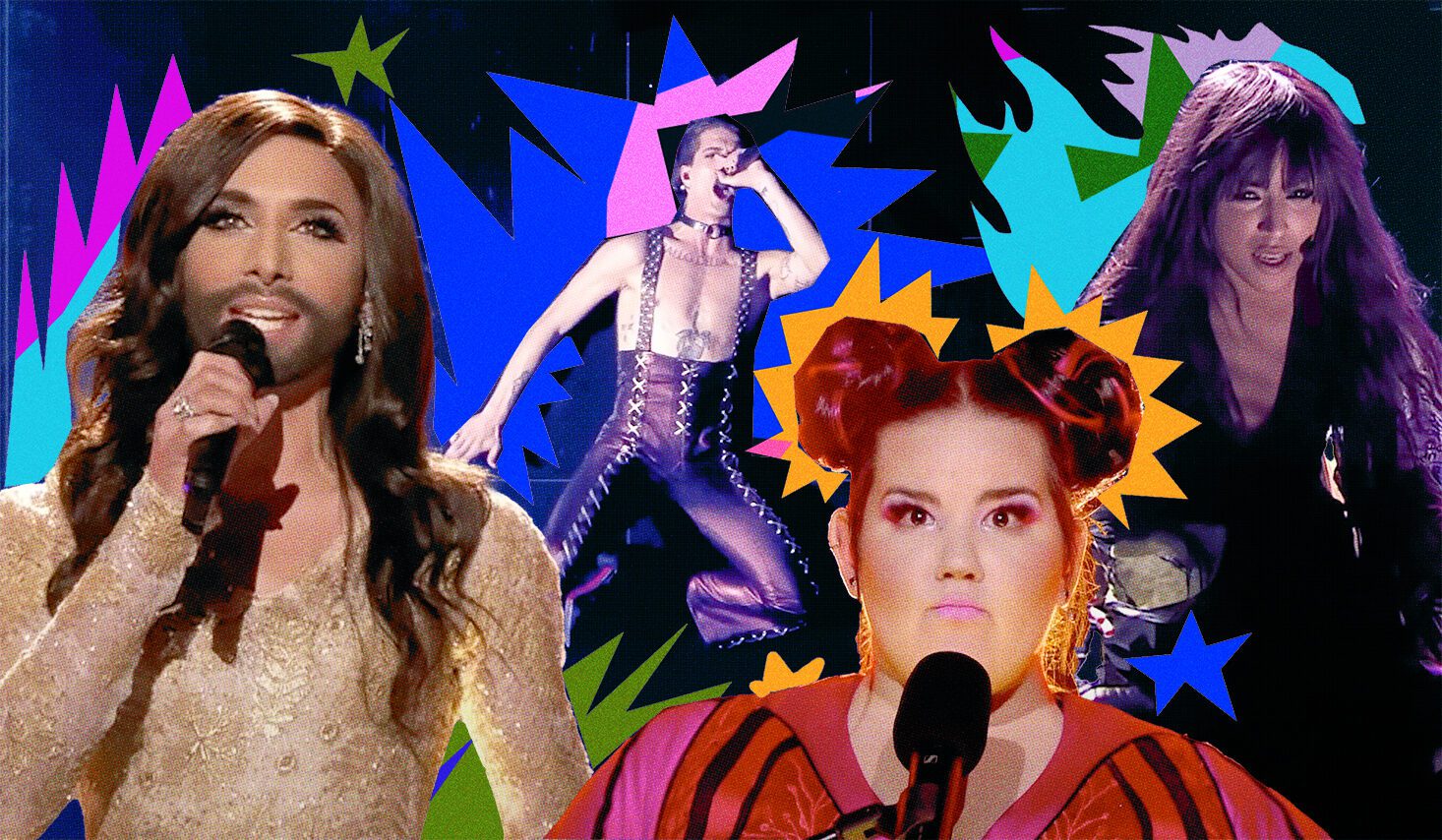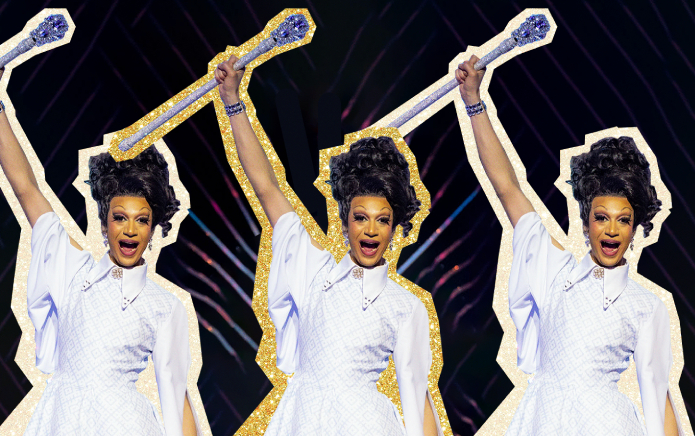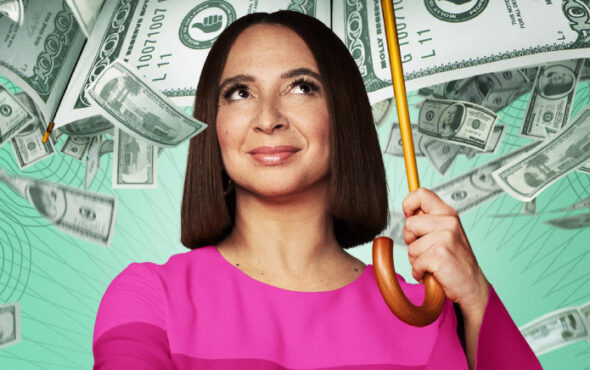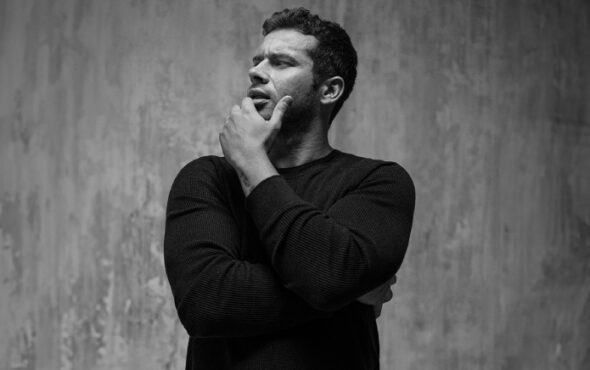
Extravagant costumes, relentless dance smashers and groundbreaking queer visibility has made the Eurovision Song Contest a staple for the LGBTQ+ community, who come out in droves each year to champion their favourite artists and celebrate the ceremony’s inclusive values.
With this year’s Eurovision looming (visit here for everything you need to know!), we took a look back at some of the campest winners and performances in the contest’s iconic 67-year history, from ABBA (of course) to trans pioneer Dana International and drag hero Conchita Wurst.
ABBA – Waterloo (1974)
With their europop classic Waterloo, ABBA made history as Sweden’s first-ever Eurovision winners. (For the contest’s 50th anniversary, it was also ranked the competition’s best-ever song.) The performance was as camp and exuberant as you’d expect: Agnetha Fältskog served disco diva in her iconic blue jumpsuit and silver platform boots while Anni-Frid Lyngstad gave us glitzy boho in her terracotta ensemble. (The men were there too!) Waterloo catapulted the quartet to worldwide superstardom and served as a springboard for later camp pop culture moments such as every single ABBA song that followed, the theme song to Kathy Burke’s cult comedy series Gimme Gimme Gimme and Cher’s tribute album.
Celine Dion – Ne partez pas sans moi (1988)
Fact incoming: Celine Dion is one of the campest and most dramatic heterosexuals in the entertainment industry (and we love it). The pop icon wore a suit/tutu hybrid (?) for her 1988 performance of French-language ballad Ne partez pas sans moi, which is still regarded as one of the most popular Eurovision entries ever, largely because of Celine’s subsequent fame. Without this performance, a camp icon wouldn’t have been born and Priyanka would have never decimated the Canada’s Drag Race stage to her cover of I Drove All Night. Think! About! That!
Conchita Wurst – Rise Like a Phoenix (2014)
Drag has always been an essential part of Eurovision – the wigs! the makeup! everything else! – but its first drag queen winner didn’t arrive until 2014 with Conchita Wurst and her operatic pop anthem Rise Like a Phoenix. The Austrian singer-songwriter’s cultural impact was unprecedented; her performance provided more visibility for queerness – and bearded queens – around the world and she has since been hailed as, in the words of Eurovision themselves, “a symbol for tolerance and artistic freedom in Austria and beyond”. After winning, Conchita dedicated her win “to everyone who believes in a future of peace and freedom”. Need a bit more of that now, don’t we?
Dana International – Diva (1998)
‘Groundbreaking’ is often the word used to describe Dana International and it’s… correct. The Israeli singer made history twice: as the first openly trans Eurovision performer and first trans winner. Legend shit, no? In 1998, Dana stormed the Eurovision stage with her eurodance smasher Diva, an ode to powerful women throughout history such as Victoria, the Roman goddess of victory slash Queen Victoria, Greek goddess of beauty and love, as well as Cleopatra. Although the contest had welcomed openly queer winners in the past – Paul Oscar (Iceland) and Katrina and the Waves (UK) – Dana is widely credited with ushering a whole new wave of LGBTQ+ visibility for Eurovision.
Loreen – Euphoria (2012)
“The gayest song? I mean, maybe Euphoria?” Loreen recently told GAY TIMES of the eurodance banger. “Maybe I’m not supposed to say my own song! I really do think Euphoria because it represents everything; male, female, everything, up, down, ding ding!” Although it’s not an explicitly queer, rainbow flag-waving song, we can’t think of a recent Eurovision winner that rallied the LGBT’s quite like our bicon Loreen. Eleven years later, Euphoria is still in regular rotation at gay clubs and when she was announced as Sweden’s entrant this year, the queers lost it. On its beloved status within the community, Loreen explained: “I think it’s because, like myself, we’re not afraid to feel because it’s a very cinematic, dramatic song. It does the work. It’s about existing. When you sing out loud like that, it’s like standing on top of a mountain. It’s also a feeling of freedom. It has a purpose.”
Lordi – Hard Rock Hallelujah (2006)
Admittedly, the melody of Lordi’s hard-rock anthem Would You Love a Monsterman isn’t camp or gay in the slightest. The performance, however, in which the band dressed as demonic figures reminiscent of those seen in Buffy the Vampire Slayer with Finland-flag top-hats, absolutely fits the bill. Plus, queerness and horror have always been intertwined due to the genre’s exploration of otherness and queer-coded subtext. Take this lyric for example: “Would you love a monsterman? / Could you understand the beauty of the beast?” Lordi: queer icons confirmed.
MÅNESKIN – Zitti E Buoni (2020)
Androgynous rockers MÅNESKIN triumphed for Italy in 2021 with their glam-rock track Zitti E Buoni, with the performance introducing the world to their signature flamboyant style. During the winners’ reprise performance, frontman Damiano David ‘spontaneously’ locked lips with guitarist Thomas Raggi and drummer Ethan Torchio, which David said was to challenge homophobia and “overcome” stereotypes. While the band have been accused of queer-baiting, it’s dumb: both Torchio and bassist Victoria de Angelis belong to the LGBTQ+ community.
Netta – Toy (2018)
From clucking like a chicken to flipping a “stupid boy” the middle finger, Netta’s performance of Toy was an explosion of camp. It undeniably ranks as one of Eurovision’s most batshit moments thanks to the Israeli pop star’s quirky stage presence and her intense backup dancers. After her win, she told us: “I don’t sing in the orthodox way; I cluck like a chicken and do whatever I want. I control my situation, don’t wear heels. People fear difference.” (Iconic.) In the years since, Netta has become a firm fan-favourite in the LGBTQ+ community as a result of her endless activism and presence in the Pride circuit.
Ruslana – Wild Dances (2004)
In 2004, Ruslana memorably conquered the Eurovision Song Contest with Wild Dances, a jovial folk and dance-rock anthem that was instantly beloved by the LGBTQ+ community – particularly queer women. The accompanying Ukranian folklore-inspired performance paid homage to Xena: Warrior Princess – the queerest female warrior-led fantasy series in history – as Ruslana and a band of leather-clad female dancers paraded around the stage. This! Is! Eurovision!
Visit here for everything you need to know about the 2023 Eurovision Song Contest.



